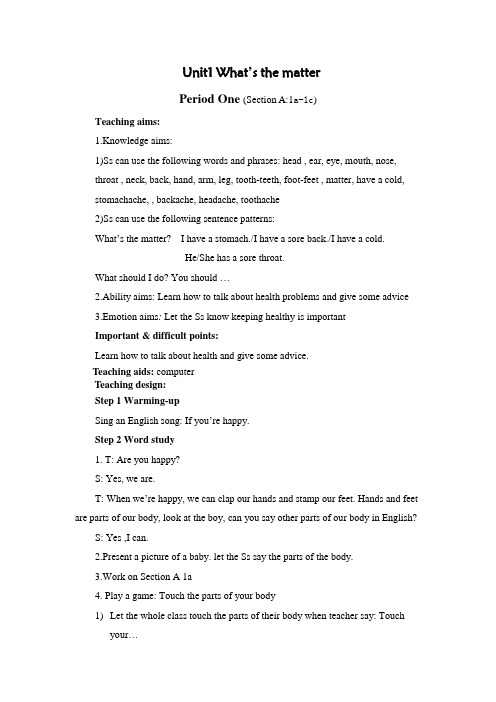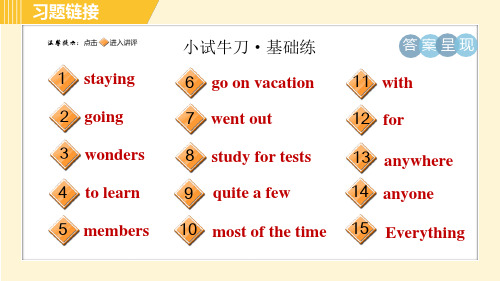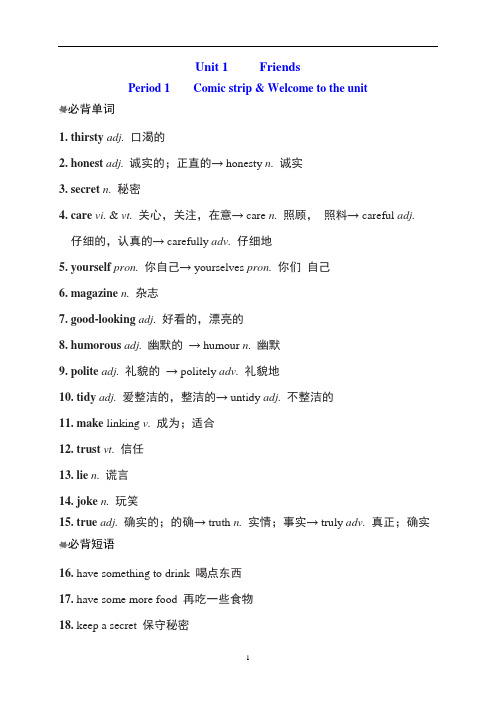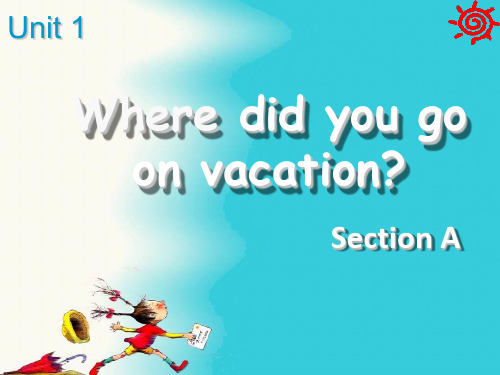八年级Unit1 Period1
英语人教版八年级下册unit1 Section A 1a-1c教案设计

Unit1 What’s the matterPeriod One (Section A:1a-1c)Teaching aims:1.Knowledge aims:1)Ss can use the following words and phrases: head , ear, eye, mouth, nose,throat , neck, back, hand, arm, leg, tooth-teeth, foot-feet , matter, have a cold, stomachache, , backache, headache, toothache2)Ss can use the following sentence patterns:What’s the matter? I have a stomach./I have a sore back./I have a cold.He/She has a sore throat.What should I do? You should …2.Ability aims: Learn how to talk about health problems and give some advice3.Emotion aims: Let the Ss know keeping healthy is importantImportant & difficult points:Learn how to talk about health and give some advice.Teaching aids: computerTeaching design:Step 1 Warming-upSing an English song: If you’re happy.Step 2 Word study1. T: Are you happy?S: Yes, we are.T: When we’re happy, we can clap our hands and stamp our feet. Hands and feet are parts of our body, look at the boy, can you say other parts of our body in English?S: Yes ,I can.2.Present a picture of a baby. let the Ss say the parts of the body.3.Work on Section A 1a4. Play a game: Touch the parts of your body1)Let the whole class touch the parts of their body when teacher say: Touchyour…2)Ask six Ss to come to the front and do as the teacher tells them: Touchyour…if one does wrong, let him or her go back, the last one who in the front is the winner.(clap hands)Step 3 Presentation and practice1. T: Are you happy? Ss: Yes, we are.T: Look at the picture, is he happy?Ss: No, he isn’t.T: Why?(Help the Ss to answer: He has a stomachache.)2.Present other pictures, talk about health problems of the persons in the pictures. What’s the matter? He/She has a headache/ toothache /a sore back/ a sore throat/a cold and a cough.3. Let the Ss practice in pairs4. T: Suppose there is something wrong with your body .You may say: I have a headache. I have a sore throat.Step 4 ChantHead, head, I have a headache. I have a headache,Stomach, stomach, I have a stomachache. I have a stomachache,Ear, ear, I have an earache. I have an earache,Tooth, tooth, I have a toothache. I have a toothache.Back, back, I have a sore back. I have a sore back,Throat, throat, I have a sore throat. I have a sore throat.Oh, dear! Do more exercise, please and keep healthy!Step 5 listen and say1.Work on Section A 1b, listen and number the names 1-5.2.Listen again and talk about the health problems of the persons in the picture.Eg: Nancy has a toothache, Sarah has a cold,…Step6. PresentationGuessing gameThe teacher shows some part of the pictures to the Ss and let them guess .T: What’s the matter with him/her?S: Does he/she have a …?T: Yes, he/she has a cold. Can you give him/ her some advice? Whatshould he /she do?S: He /She should drink hot tea with honey/ shouldn’t speak more/ go to see a doctor… (Ss can give different advice as they like)T: What’s the matter with him/her?S: Does he/she have a …?T: Yes, he / she has a / an toothache /fever / headache / earache…Whatshould he /she do?S: He /She should go to see a dentist / shouldn’t eat ice cream/shouldn’tdrink cold water /lie down and rest / shouldn’t play basketball/ shoulddrink a lot of water./should see a doctor…Step7. PracticeGroup-work. Role play the conversations in 2b. Let the Ss read the conversations first. Then work in a group, make a new conversation .A: What’s the matter?B: My head feels very hot.A: Maybe you have a fever.B: What should I do?A: You should drink hot water and take some medicineStep 8 Summary。
人教版八年级上册英语-unit1-2教案

Unit 1 How often do you exercise?Period 1 New words learningTeaching Aims:1. Make students pronounce the words correctly.2. Make students recite the new words with Chinese meanings.Teaching procedure:1. Daily greeting2. Show teaching aims3. Teacher guides students to learn the new words.Step 1 T: Please read the new words in Unit one by yourself. Let us see who can pronounce the words best and who can read the most words. I will give you 10 minutes to do that. After that, I will ask some students to read the words.Ss learn by themselves:1. Ask Ss to read the new words by themselves by using the international alphabet.2. Make Ss listen to the tape and check if they can read the words correctly. Underline the words which they cannot pronounce or pronounce correctly.Teacher teaches:Teacher play the recoding and ask student check their pronunciations according to the tape.Step 2 T: Now you please read the words by yourselves. I will give you 10 minutes and then I will check your work.Ss learn by themselves:1. Ss read the new words, the teacher walk around the classroom and check if the Ss can read the words well.2. The teacher shows the new words on the blackboard, Ss close books and check by themselves then check with their deskmates.Teacher teaches:Check the pronunciations especially the poor students. And teacher should teach the difficult words.Step 3 T: Remember the new words. I will give you 15 minutes.Ss learn by themselves:1. Ss remember the new words2. Ss can use different ways to remember the new words.Teacher teaches:Teach some difficult words.4. Practice in classHave a dictation and ask Ss to write the new words on the exercise books.Teacher checks.Period 2 Section A(1a-2c)Teaching Aims:1. Grasp the main sentences and impressions in this period.2. Use the sentences to talk about how often you do things.Teaching procedureStep1. Daily greeting and show teaching aims. (1’)Step 2 PresentationComplete Activity 1a. (6’)1. First let the Ss discuss the picture and then ask the students to make a list of the different weekendactivities2. Next let two students talk about their own weekend activities and them tell their activities.3. Finally the teacher writes the activities on the blackboard. Teach them and let the students read loudly. Step 3 Listening practice. (8’)1. Listen to 1b twice. Write the letters from the picture. After listening ,learn the 6 words and introducethese words.2. Listen again and repeat loudly.3. Ss read loudly the listening materials for 3 minutes.Step 4 Present conversations.(5’)1. Read the conversation in pairsA: What do you usually do on weekends? B:I usually go to the movies.A: How often do you watch TV? B:I watch TV once a week .2. Make the new conversations.Step 5 Listening practice. (8’)1. Listen to 2a and 2b twice. First number the activities , then match the activities with the number of times.2. Listen again and repeat loudly (open)3. Ss read loudly the listening materials for 3 minutes.Step 6 Presentation(5’)Do Activity 2c.First let the Ss fill in the chart,then make their own dialogues according to the given conversation.Step 7 Class exersices:1)--____do you help the old man with the housework? --Once a week.A. How soonB. How longC. How oftenD. How many2) My mother _______surfs the Internet. She likes watching TV.A. doesn't hardly everB. hard everC. isn't hardly everD. hardly ever3) What are the _______ of your exams? A. answers B. problems C. results D. things4) -----What does she do on ________? -----She often go to the movies.A. Every weekB. a weekC. weekendD. weekends5) -------______do you do sports? --------I do sports every day.A. WhenB. What timeC. How longD. How often教學反思:Period 3 Section (3--4)Teaching Aims:1. Understand the main idea of this article.2. Learn to use the new words and expressions to talk about how often people do things.Teaching procedureStep 1. Daily greeting and show teaching aims. (1’)Step 2. Read the article carefully and fill in the blanks.(5’)Step 3. Read the passage again and underline some important words.(5’)Step 4. Read loudly alone for about 4 minutes. (4’)Step 5. Retell or recite (10’)Step 6. Discuss language difficulties in group to help each other.(5’)1. Discuss in groups2. Discuss in class3. The teacher explains.Step 7 Speaking and writing activities. (5’)Interview in groups and fill in the chart, then find out who is the best English student?Write a passage according to the filled chart.Step 8. Class exercisesA)根據句意,用括號內所給詞の適當形式填空。
人教版八年级上册英语习题课件Unit1Period1SectionA1a2d

融会贯通·提升练
We’re staying in a camp, not far from Cape Town. Every day we wake ___u__p___22 early and leave the camp at 6 a. m. Our guide, Tony, takes us to different places. Yesterday, he took us to a river. There __w__e_r_e__23 different kinds of animals there, like elephants, lions, monkeys and giraffes. Before leaving, we saw something terrible.
Tomorrow we’re going to see ____a_n___25 African dance performance. It’s going to be fun.
I’ll be back home next Friday. See you soon. Yours,
William
习题链接
人教版高中英语同步练习:选修8 unit 1 period 1(含答案)(精修版)

人教版英语精品资料(精修版)Unit 1 A land of diversity Period 1 Warming Up,Pre-reading & Reading 同步精练(人教版选修8,课标通用)Ⅰ.介、副词填空1.Some of the president's advisers feared Hitler might declare war________the United States.2.We kept________our friendship for over twenty years.3.The old people died but the young ones lived________.4.He succeeded________means________perseverance.5.________the time he was ten, Tom had built a chemistry lab himself.6.She has two cars, and________addition, a motorboat.7.We hope the garden to keep________the weeds.8.Millions of people die________the illnesses caused by smoking.答案 1.on 2.up 3.on 4.by of 5.By 6.in7.down 8.fromⅡ.单词拼写1. He drew a quite artificial________(差别) between men and women readers. 2.Whisky contains a large________(百分比) of alcohol.3.Gradually she learned to make a joke of all these________(困难).4.The ________(部) of Transport made a searching enquiry to discover the cause of the plane crash.5.The oil market is enjoying a ________(繁荣).6.The ________(种族的) discrimination issue is a political hot potato. 7.Leonardo da Vinci is a famous artist in the ________(意大利) Renaissance.8.In the USA foreign policy is decided by the ________(联邦的) government. 9.The ________(大多数)of people seem to prefer TV to radio.10.He was ________(选举) chairman of the education committee.答案 1.distinction 2.percentage 3.hardships 4.Ministry 5.boom 6.racial7.Italian8.federal9.majority 10.electedⅢ.翻译与仿写1. However, it is likely that Native Americans were living in California at least fifteenthousand years ago.翻译:_____________________________________________________________ 仿写:这次会议有可能会由于天气原因而被推迟。
人教版八年级下册英语 Unit 1 习题课件 Period 1 Section A (1a-2c)

【点拨】used to do sth.“过去经常做某事” ,为固 定词组。根据后面的直接引语可知,这里是指 “疑问”。
Inthosedays, whenpeoplesawarunner, theyused______6, “Hey, what'sthehurry?” ortheymightsayto______7, “Ishecrazy?” Womenalmostnever______8. 7.AB. them B. themselvesC. theirs D. they
fruitjuiceorbread.My
______3
(I)
momisgoingshoppingnow.
Ihavesomemilk,
breadandaneggforb_r_e_a_k_f_a_s_t4.
It'simportanttohaveagoodbreakfast.
Ihaverice,
fishandvegetables______5lunch. for
toothache, what’sthematter, stomach, shtomuladc, h takeyourtemperature
toothache, what’s the matter, stomach, should, take your temperature
toothache, what’sthhoeumldatter, stomach, should, takeyourtemperature
toothache, what’s the matter,
译林版八年级上册英语Unit 1 单元词句梳理

Unit 1 FriendsPeriod 1 Comic strip & Welcome to the unit必背单词1. thirsty adj.口渴的2. honest adj. 诚实的;正直的→ honesty n. 诚实3. secret n.秘密4. care vi. & vt.关心,关注,在意→ care n.照顾,照料→ careful adj.仔细的,认真的→ carefully adv. 仔细地5. yourself pron.你自己→ yourselves pron.你们自己6. magazine n.杂志7. good-looking adj. 好看的,漂亮的8. humorous adj. 幽默的→ humour n. 幽默9. polite adj. 礼貌的→ politely adv.礼貌地10. tidy adj.爱整洁的,整洁的→ untidy adj. 不整洁的11. make linking v. 成为;适合12. trust vt.信任13. lie n. 谎言14. joke n. 玩笑15. true adj.确实的;的确→ truth n.实情;事实→ truly adv.真正;确实必背短语16. have something to drink 喝点东西17. have some more food 再吃一些食物18. keep a secret 保守秘密19. make sb. happy 使某人开心20. share one’s joy 分享某人的快乐21. care about 关心;关怀22. tell him/her everything about yourself告诉他/ 她关于你自己的一切23. be ready to do sth.准备好/ 乐意做某事24. have problems with... ……有问题25. tell lies 撒谎26. tell sb. funny jokes 给某人讲滑稽的笑话必背句子27. Can I have something to drink, please?我能喝点儿东西吗?28. What about some milk?喝点儿牛奶怎么样?29. Can I have some more food?我能再吃一些食物吗?30. Maybe we can share it.也许我们可以分享它。
人教版八年级英语Unit1 Where did you go on vocation?period1

Where did you go on vacation?
Section A
Went to the beach took photos ate good food
东莞市常平中学初中部 向梓毅
I went to the beach.
a
I went to New York y) the computer games yesterday? 2.Who _________
3.We ________(go) to the movie last night. The film _____(be) went was
very good.
get (get) to school this morning? 4.What time _____ did you ______
-I /He/She went to summer camp.
询问某人做过某事
句型:-Did you/he/she go to the movies last night? -Yes,I /he/she did. No,I /he/she didn’t
巧记动词过去时态
动词一般过去时,表示过去发生的事; be用was或用were, have, has变had; 谓语动词过去式,过去时间作标志; 一般动词加-ed,若是特殊得硬记。 否定句很简单,主语之后didn’t添; 疑问句也不难,did放在主语前; 如果谓语之前有did,谓语动词需还原; 动词若是was, were,否定就把not添。
f
e b a
2. went to New York City
c
g 3. visited my uncle____
4. went to summer d camp ______
新目标八年级英语上册Unit1-全单元

8
at home
Where did she go on vacation ?
She stayed at home and cooked .
最新版整理ppt
9
beach
Where did they go on vacation ?
They went to the beach .
最新版整理ppt
10
beach
home
最新版整理ppt
22
2b
Listen again. For each question check (√ ) “Yes , I did .” or “No , I didn’t.” as you hear them talk .
Grace Kevin Julie
Did you …
3
mountain volcano /vɑlˈkenəʊ/
最新版整理ppt
4
Brainstorming
Have you been to some interesting places on your vacation?
Would you please share your happy experiences with your partners?
最新版整理ppt
18
Did they play beach volleyball(沙滩排球)? Yes , they did.
最新版整理ppt
19
Did he go to the beach? No, he didn’t. He went the mountains.
最新版整理ppt
20
A: Hi! Where did you go on vacation ? B: I went to …... A: Oh, really? B: Yes. Did you go to ……? A: Yes, I did . (No, I didn’t .)
- 1、下载文档前请自行甄别文档内容的完整性,平台不提供额外的编辑、内容补充、找答案等附加服务。
- 2、"仅部分预览"的文档,不可在线预览部分如存在完整性等问题,可反馈申请退款(可完整预览的文档不适用该条件!)。
- 3、如文档侵犯您的权益,请联系客服反馈,我们会尽快为您处理(人工客服工作时间:9:00-18:30)。
robot
Did people have robots in their homes 100 years ago? Do people have robots in their homes now? Will people have robots in their homes in 100 years ?
书只会在电脑上,而不会在纸上. 书只会在电脑上,而不会在纸上.
___A___D 4.Kids won’t go to school. They’ll study at home on computer.
孩子们将不上学.他们在家用电脑学习. 孩子们将不上学.他们在家用电脑学习.
___A___D 5.There will only one country.
People will have robots in their homes.
否定句: 即可。 否定句:在will 的后面加not即可。will not = won’t
People will not (=won’t) have robots in their homes.
一般疑问句: 提到句子主语之前,结尾变问号。 一般疑问句:把will 提到句子主语之前,结尾变问号。
Will people have robots in their homes? Yes , they will ./ No , they won’t .
will 引导的一般将来时 一般将来时表示将来发生的动作或情况, 引导的一般将来时:一般将来时表示将来发生的动作或情况 一般将来时表示将来发生的动作或情况, 最基本的结构: 最基本的结构:will + 动词原形
“主谓(宾)句型”的一般将来时: 主谓( 句型”的一般将来时: 肯定句:主语 动词原形+(宾语) 其他成份 肯定句:主语+ will +动词原形 (宾语)+其他成份 动词原形
in the future
A B. C dfaoptj. 12 + =? ?。。。
Kids won’t go to school. They’ll study at home on computers.
= they will
in the future
There will only be one country. People will live to be 200 years old.
Will
every
home have a car? Yes ,they will They will have a car. car.
Will these be true in the future?
___A___D 1.People will have robots in their homes.
A: I bet kids won’t go to school. They’ll__________________________. study at home on computers B: Oh, I disagree. A: You do? B: Yeah, there will always be schools.
世界上只有一个国家. 世界上只有一个国家.
___A___D 6.People will live to be 200 years old.
人们将会活到 岁 人们将会活到200岁. 活到200
1.人们家里将有机器人。 人们家里将有机器人。 人们家里将有机器人 People will have robots in their homes. 2.人们将不再用钱了。所有的东西都将免费。 人们将不再用钱了。所有的东西都将免费。 人们将不再用钱了 People won’t use money. Everything will be free. 3.书本只出现在电脑上,不再是纸做的。 书本只出现在电脑上,不再是纸做的。 书本只出现在电脑上 Books will only be on computers,not on paper. 4.孩子们将不上学。他们将在家里通过电脑学习。 孩子们将不上学。他们将在家里通过电脑学习。 孩子们将不上学 Kids won’t go to school. They’ll study at home on computers. 5.将来只有一个国家了。 将来只有一个国家了。 将来只有一个国家了 There will only be one country . 6.人们将活到 人们将活到200岁。 岁 人们将活到 People will live to be 200 years old.
Unit 1
Will people have robots?
Did people use computers 100 years ago? Do people use computers now? Will people use computers 100 years later? ? Yes, they will. No, they won’t.
人们在家将有机器人. 人们在家将有机器人.
___A___D 2.People won’t use money. Everything will be free.
人们将会不用钱.所有的东西都是免费 人们将会不用钱.所有的东西都是免费的. 免费的
___A___D 3.Books will only be on computer,not on paper.
Will people live to be 200 years old ?
1b.Listen and circle the predictions you hear in activity 1a.
1.People will have robots in their homes. 2.People won’t use money. Everything will be free. 3.Books will only be on computers, not on paper. 4.Kids won’t go to school. They’ll study at home on computers. 5. There will only be one country. 6. People will live to be 200 years old.
A: Do you think people will have robots in 100 years in their homes ________________? a robot on TV cleaned the kitchen B: Yes, I do. I saw____________, and it_________________ . A: Well, I don’t think people will ______ money. use B: Do you think everything______________? will be free A: Yeah, probably. will be B: I think there __________only one country. A: Only one country ___________________? in the whole world Will there be ___________ ? world peace B: I hope so.
Tapescript: people will have robots in A:Do you think _______________________ A:Do their homes ___________in 100 years? B:Yes,I do. I saw a robot on TV, and it B:Yes,I TV, cleaned the kitchen. A:Well, ______________________________. A:Well, I don’t think people will use money everything will be free B:Do you think____________________? B:Do A: Yeah, probably大概,或许. there will be one country B:I think______________________. B:I A:Only one country in the whole world? Will A:Only there be world peace 和平? B:I hope so. B:I so.
a piece of paper
Did people use paper 100 years ago? Do people use paper now? Will people use paper in 100 years? ?
Do you think the world will be different in the future? ? What do you think will happen in 100 years? Will people use money? Will everything be free? Will kids go to school? Will people just go shopping at home? ……
robot
People will have robots in their homes.
in the future
People won’t use money. Everything will be free.
使用
won’t= will not
免费的
in the future
Books will only be on computers, not on p robots in their homes ? Will people use money in 100 years ? Yes, they will. will. Will books be only on computer ? Will kids go to school ? Will they study at home ? Will there only be one country ? No, they/ there won’t . they/
